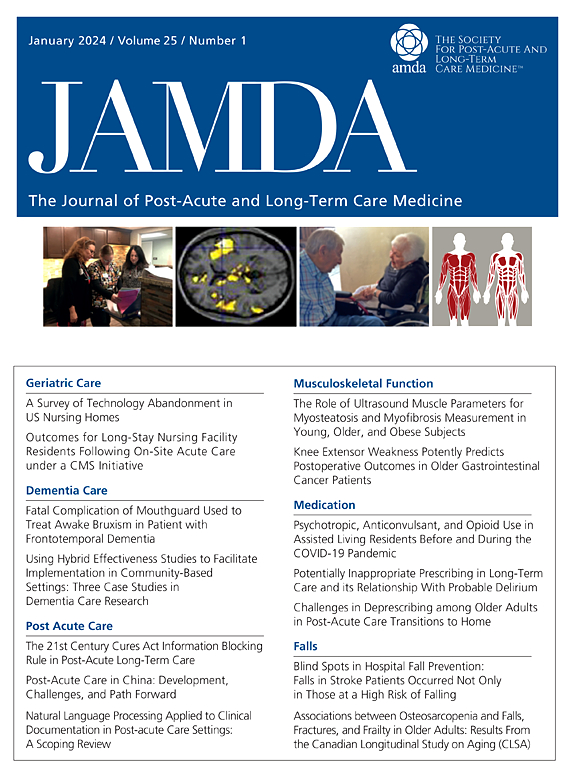Effects of Exercise Intervention on Functional Mobility among Older Adults with Cognitive Impairment: A Quantitative Evidence
IF 4.2
2区 医学
Q2 GERIATRICS & GERONTOLOGY
Journal of the American Medical Directors Association
Pub Date : 2025-03-28
DOI:10.1016/j.jamda.2025.105516
引用次数: 0
Abstract
Objectives
This meta-analysis aimed to assess the effect of exercise interventions on functional mobility among older adults with cognitive impairments such as dementia or mild cognitive impairment, followed by further investigation on the possible moderators of exercise-induced effects on this outcome.
Design
A meta-analysis of controlled trials on exercise interventions reporting functional mobility outcomes was conducted. PubMed, Embase, EBSCO, SPORTDiscus, and Web of Science were searched for relevant studies published in English-language journals through July 2024.
Setting and Participants
Clinical and community settings across 15 countries, including a total of 1104 older adults with cognitive impairment, were involved in the study.
Methods
We computed pooled effect sizes based on standardized mean difference (SMD) using the random-effects models. The subgroup analyses and meta-regression were conducted for multiple moderating variables (eg, exercise, sample, and study characteristics). The study quality was evaluated using the Physiotherapy Evidence Database Scale.
Results
This meta-analysis finally included 22 studies. Results revealed that exercise interventions effectively improved functional mobility as compared with that of the control group (SMD, −0.42; 95% CI, −0.61 to −0.24; P < .001). Exercise intervention characteristics (ie, weekly training frequency and session duration) and sample characteristic (ie, percentage of women) moderated the exercise-induced effects on this interesting outcome. Subgroup analyses showed intervention with low frequency (1–2 times/wk) (SMD, −0.71; 95% CI, −1.01 to −0.42; P < .001) had a larger improvement in mobility, followed by medium frequency (SMD, −0.33; 95% CI, −0.56 to −0.10; P < .01). In addition, interventions with a session duration of > 60 minutes (SMD, −0.60; 95% CI, −0.84 to −0.36; P < .001) and 45 to 60 minutes (SMD, −0.60; 95% CI, −0.91 to −0.29; P < .001) had a significant improvement in mobility. Moreover, exercise training had a significant improvement in mobility for studies with a high percentage of women (SMD, −0.49; 95% CI, −0.67 to −0.31; P < .001).
Conclusions and Implications
Exercise intervention is a promising way to improve functional mobility among older adults with cognitive impairment. Further evidence suggests that larger effects were observed in exercise intervention features of more than 45-minute session duration 1 to 3 times a week for at least 6 weeks regardless of exercise type. In addition, women benefit more from exercise interventions than men. Our study highlights that health care providers should prioritize integrating structured exercise programs into routine care for this population.
求助全文
约1分钟内获得全文
求助全文
来源期刊
CiteScore
11.10
自引率
6.60%
发文量
472
审稿时长
44 days
期刊介绍:
JAMDA, the official journal of AMDA - The Society for Post-Acute and Long-Term Care Medicine, is a leading peer-reviewed publication that offers practical information and research geared towards healthcare professionals in the post-acute and long-term care fields. It is also a valuable resource for policy-makers, organizational leaders, educators, and advocates.
The journal provides essential information for various healthcare professionals such as medical directors, attending physicians, nurses, consultant pharmacists, geriatric psychiatrists, nurse practitioners, physician assistants, physical and occupational therapists, social workers, and others involved in providing, overseeing, and promoting quality

 求助内容:
求助内容: 应助结果提醒方式:
应助结果提醒方式:


